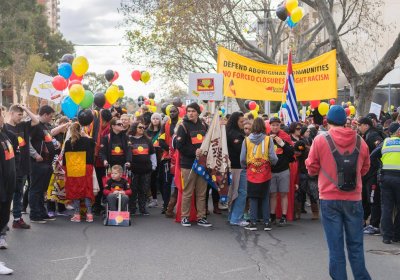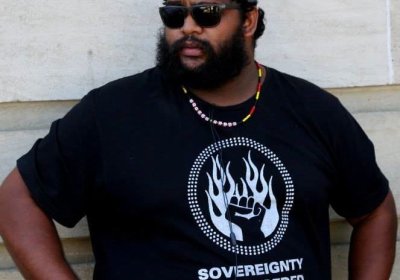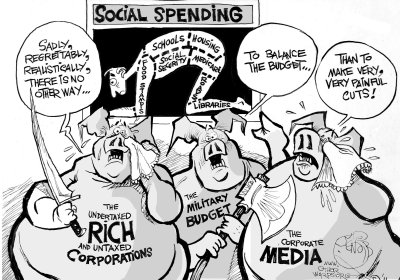About 1200 people marched through Melbourne on July 8 in the annual National Aborigines and Islanders Day Observance Committee (NAIDOC) march. The rally demanded "Treaty Now", "Land Rights" and "Stop Deaths in Custody".
Aboriginal and Torres Strait Islander Peoples
The federal Coalition government is planning to hold a referendum in 2017 on Constitutional Recognition of Australia’s original inhabitants. So far the campaign consists of establishing the Recognise campaign, in a bid to educate Australians about the importance of the recognition referendum.
The government has already funded the Recognise campaign to the tune of $15 million, and promised another $15 million in this year’s budget. At the same time, it has cut funding to Aboriginal medical centres, Aboriginal legal services and other Indigenous programs and services.
Photos from Invasion day rallies across the country where thousands of people marched for Aboriginal rights.
Always Was! Always Will Be! Aboriginal Land!
Sydney
Photos by Zebedee Parkes






Captain Arthur Phillip took formal possession of the colony of New South Wales and raised the flag for the first time in Sydney Cove on January 26, 1788.
In the early 1880s the day was known as “First Landing”, “Anniversary Day” or “Foundation Day”. In 1946 the Commonwealth and state governments agreed to unify the celebrations on January 26 and call it “Australia Day”.
The federal government is proposing to hold a referendum to formally recognise Aboriginal and Torres Strait Islander people in the Australian Constitution.
Sounds like a good progressive idea? Many prominent Aboriginal leaders disagree.
* * *
“Constitutional recognition is said to be about equality and civil rights, but what we're fighting for is the right to determine our own destiny. This government isn't ready to facilitate real power sharing. When nations enter into treaties they share economic power.
This is part of a series of articles detailing the policies and platform the Socialist Alliance will be taking to the Federal election.
* * *
For tens of thousands of years, the Aboriginal and Torres Strait Islander peoples of this continent and its islands looked after the diverse ecosystems, developed complex languages and cultures, and traded among themselves and with visitors from overseas. They were strong, proud peoples.
Resistance: Young Socialist Alliance’s “World to Win” series, aims to give voice to the ideas and aspirations of radical young people who are involved in the struggle for social change. This week, Murray Taylor discusses the ideas behind wealth inequality and the demand for redistribution.
* * *
Remember how Treasurer Joe Hockey promised that all Australians would pay an equal share in his efforts to balance the budget and assist in this recovery?
A 59-year-old Aboriginal man died in Darwin on May 21 while being held under controversial new “paperless arrest laws”. These laws give police the powers to arrest people for summary offences — such as “obscenity”, undue noise, offensive language — and hold them for up to four hours at a time.
In NSW, a program that has been proved to prevent Aboriginal deaths in custody has lost funding under the federal government’s ironically named Indigenous Advancement Strategy.
Hard-hitting rapper Miss Hood comes from a long line of women warriors. Her ancestors, the Kunai and Gunditjmara people of eastern and western Victoria, put female fighters on the frontline. "Both of the tribes were matriarchal, so women were equal to men," says the Melbourne-based emcee. "It wasn't unusual to have women warriors as well as men warriors." Little wonder, then, that her music packs such a powerful feminist punch.
- Previous page
- Page 2
- Next page








